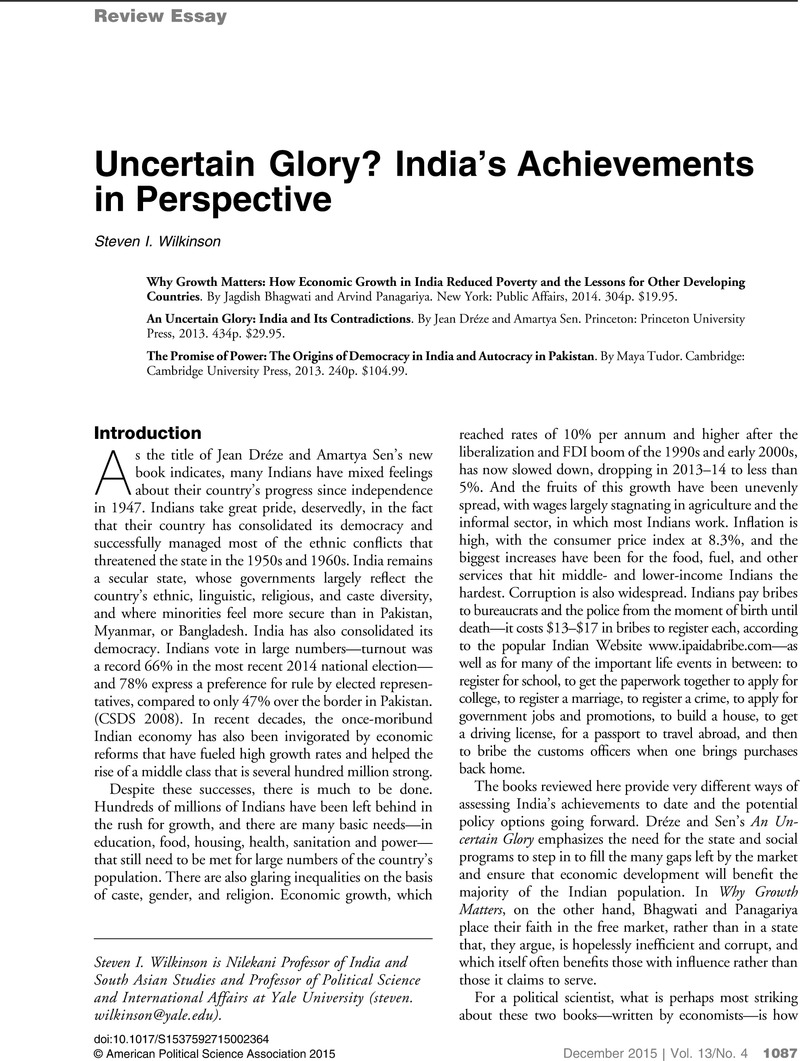No CrossRef data available.
Article contents
Uncertain Glory? India’s Achievements in Perspective
Review products
Why Growth Matters: How Economic Growth in India Reduced Poverty and the Lessons for Other Developing Countries. By BhagwatiJagdish and PanagariyaArvind. New York: Public Affairs, 2014. 304p. $19.95.
An Uncertain Glory: India and Its Contradictions. By DrézeJean and SenAmartya. Princeton: Princeton University Press, 2013. 434p. $29.95.
The Promise of Power: The Origins of Democracy in India and Autocracy in Pakistan. By TudorMaya. Cambridge: Cambridge University Press, 2013. 240p. $104.99.
Published online by Cambridge University Press: 15 December 2015
Abstract
An abstract is not available for this content so a preview has been provided. Please use the Get access link above for information on how to access this content.

- Type
- Review Essays
- Information
- Copyright
- Copyright © American Political Science Association 2015
References
Acemoglu, Daron and Robinson, James A.. 2012. Why Nations Fail: The Origins of Power, Prosperity, and Poverty. New York: Crown Business.Google Scholar
Acemoglu, Daron, Johnson, Simon, and Robinson, James A.. 2001. “The Colonial Origins of Comparative Development: An Empirical Investigation,” American Economic Review 91(5): 1369–1401.CrossRefGoogle Scholar
Banerjee, Abhijit and Iyer, Lakshmi. 2005. “History, Institutions and Economic Performance: The Legacy of Colonial Land Tenure Systems in India?” American Economic Review 95(4): 1190–1213.CrossRefGoogle Scholar
CSDS (Centre for the Study of Developing Societies). 2008. State of Democracy in South Asia. New Delhi: CSDS/Oxford University Press.Google Scholar
Deaton, Angus. 2013. “What’s Going On India?” The Lancet 382 (September 21): 1015–16.CrossRefGoogle Scholar
Dréze, Jean and Sen, Amartya. 1998. India: Economic Development and Social Opportunity. New Delhi: Oxford University Press.Google Scholar
Herbst, Jeffrey. 2000. States and Power in Africa: Comparative Lessons in Authority and Control. Princeton: Princeton University Press.Google Scholar
Herbst, Jeffrey. 2004. “African Militaries and Rebellion: The Political Economy of Threat and Combat Effectiveness,” Journal of Peace Research 41:357–369.CrossRefGoogle Scholar
Huntington, Samuel P. 1968. Political Order in Changing Societies. New Haven: Yale University Press.Google Scholar
Iyer, Lakshmi. 2010. “Direct Versus Indirect Colonial Rule in India: Long-Term Consequences.” Review of Economics and Statistics 92(4): 693–713CrossRefGoogle Scholar
Horowitz, Donald L. 1985. Ethnic Groups in Conflict. Berkeley: University of California Press.Google Scholar
Jalal, Ayesha. 1987. “India's Partition and the Defence of Pakistan: an Historical Perspective” Journal of Imperial and Commonwealth History 15(3): 289–310.CrossRefGoogle Scholar
Jalal, Ayesha. 1992. The State of Martial Rule: The Origins of Pakistan’s Political Economy of Defence. New Delhi: Foundation Books.Google Scholar
Krishnamurty, J. 2008. “The Occupational Structure.” In The Cambridge Economic History of India: Volume II c.1757–2003, ed. Kumar, Dharma. New Delhi: Orient Longman, 533–52.Google Scholar
Kumar, Dharma. 2005. The fiscal system. In Kumar, Dharma, ed., The Cambridge Economic History of India Volume II: c.1757–2003, 905–946. New Delhi: Orient Longman/Cambridge, p. 915.Google Scholar
Kumar, Dharma, 2008. “Regional Economy 1757–1857: South India.” In The Cambridge Economic History of India: Volume II c.1757–2003, ed. Kumar, Dharma. New Delhi: Orient Longman, 352–76.Google Scholar
Mahoney, James. 2010. Colonialism and Postcolonial Development: Spanish America in Comparative Perspective. New York: Cambridge University Press.CrossRefGoogle Scholar
Mainwaring, Scott and Scully, Timothy R.. 1995. Building Democratic Institutions: Party Systems in Latin America. Stanford: Stanford University Press.Google Scholar
Moore, Barrington. 1966. Social Origins of Dictatorship and Democracy: Lord and Peasant in the Making of the Modern World. Boston: Beacon Press.Google Scholar
North, Douglass C. 2005. Understanding the Process of Economic Change. Princeton: Princeton University Press.CrossRefGoogle Scholar
Nossiter, T. J. 1982. Communism in Kerala: A Study in Political Adaptation. Berkeley: University of California Press.Google Scholar
Nussbaum, Martha. 2001. Women and Human Development. New York: Cambridge University Press.Google Scholar
Oldenburg, Phillip. 2010. India, Pakistan, and Democracy: Solving the Puzzle of Divergent Paths. New York: Routledge.CrossRefGoogle Scholar
Ramusack, Barbara N. 2007. The Indian Princes and Their States. New York: Cambridge University Press.Google Scholar
Santhanam, K. 1962. Report of the Committee on Prevention of Corruption New Delhi: Ministry of Home Affairs Government of India.Google Scholar
Slater, Dan. 2010. Ordering Power: Contentious Politics and Authoritarian Leviathans in Southeast Asia. New York: Cambridge University Press.CrossRefGoogle Scholar
Thorat, Sukhadeo and Newman, Katherine S., eds. 2010. Blocked by Caste: Economic Discrimination in Modern India. New Delhi, Oxford University Press.Google Scholar
Treisman, Dan. 2000. “The Causes of Corruption: A Cross-National Study.” Journal of Public Economics 76(3): 399–457.CrossRefGoogle Scholar
U.P. (United Provinces Pay Committee). 1947. Report of the United Provinces Pay Committee 1947. Allahabad: Superintendent, Printing and Stationery, United Provinces.Google Scholar
Weiner, Myron. 1989. The Indian Paradox: Essays in Indian Politics. New York: Sage Publications.Google Scholar
Weiner, Myron. 1991. The Child and the State in India. Princeton: Princeton University Press.CrossRefGoogle Scholar
Wilkinson, Steven I. 2010. “Data and the Study of Indian Politics.” In The Oxford Companion to Politics in India, ed. Jayal, Niraja Gopal and Mehta, Pratap Bhanu. New Delhi: Oxford University Press, 587–601.Google Scholar
Wilkinson, Steven I. 2015. Army and Nation: The Military and Indian Democracy since Independence. Cambridge, MA: Harvard University Press.CrossRefGoogle Scholar
Woodberry, Robert. 2012. “The Missionary Roots of Liberal Democracy.” American Political Science Review 106(2): 244–74.CrossRefGoogle Scholar


